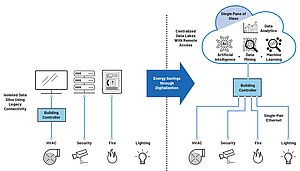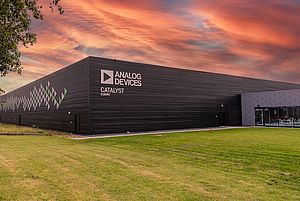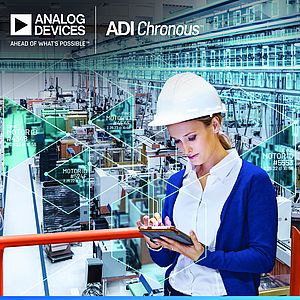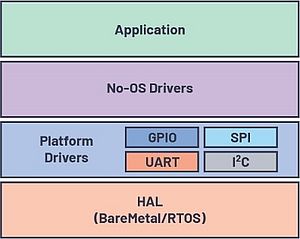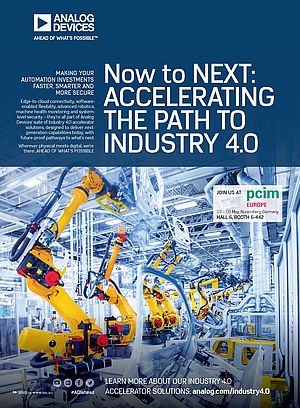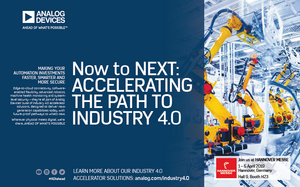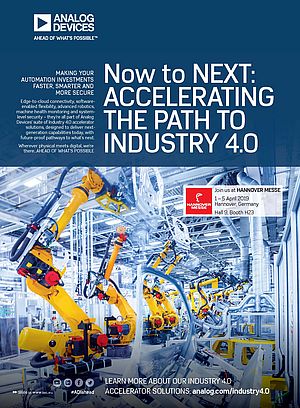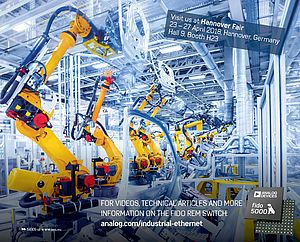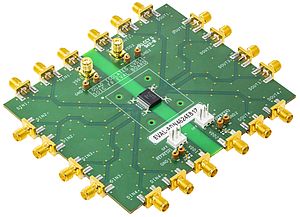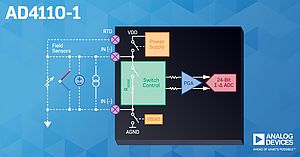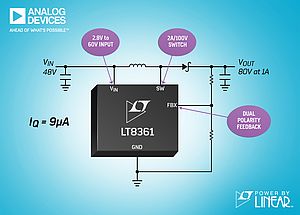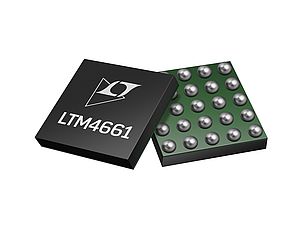Interview number 5 of our virtual round table: Mike Britchfield, Vice President Sales, EMEA at Analog Devices
IEN Europe: How is your company tackling the COVID-19 emergency?
M. Britchfield: ADI’s first priority has always been the safety of our employees, their families and our community.
In many ways, our global presence – which includes the Asia-Pacific region – gave us a head start in terms of putting processes in place for a potential outbreak of the Covid-19 coronavirus. With the wellbeing of more than 16,000 employees to consider, a proactive approach towards this unprecedented situation was essential.
From the very beginning of the pandemic, ADI followed three guiding principles – Protect, Comply and Serve. These principles were an essential platform on which to build our response to the emergency, not only in terms of communicating our position to the workforce (which included frontline workers in our factories), but also our partners and customers. We realized early on that the existing business optimization strategy would have to be adjusted to meet the needs of the organization’s stakeholders, a situation that required us to rethink how we would operate in this different world.
For example, ADI is redistributing our supply plans among the global manufacturing operations and channel partners and redistributing deliveries between customers that are operating with reducing manufacturing operations in a variety of locations. Some industry sectors are experiencing high demand for their products – healthcare is the obvious use case, naturally – and we need to make certain that these customers are able to operate effectively within the limitations that the pandemic is imposing.
Ultimately, this is an ever-changing landscape and one that we have to navigate with our eyes wide open from day one. A significant number of employees in our physical locations have been “virtual” from March 11 and working from home. In addition, those involved in the manufacturing and ongoing quality management processes are provided with the necessary protections to make sure that our commitment to customers is as unbroken as possible.
IEN Europe: How much has this crisis impacted/will impact on your business?
M. Britchfield: The impact of Covid-19 is still hard to quantify. On a financial level, our business strategy has moved to take account of providing customers with what they need when they need it. In fact, we are constantly finding new ways to be part of the solution. As we noted above, the adoption of a proactive attitude across the company is a vital step in terms of not only existing business optimization processes but also how we approach the remainder of the financial year.
The economic and social effects of the pandemic is causing widespread disruption in almost every country, and the scale of that disruption is dependent on how an individual country is dealing with the disease itself. Supply chains are forced to adapt and there is an understandable uncertainty as to how certain industry sectors will reboot once we get back to approaching normality. The caveat to this is that ADI has encountered several “Black Swan” events in our 55 years of being in business, albeit that Covid-19 is one that moves the goalposts for both the private and the public sector.
From our perspective, we are very proud of the response to the pandemic and we are working closely with numerous customers to ensure that their working operations suffer minimal disruption. Healthcare is an important sector for ADI and we have increased production of healthcare technologies and products essential for medical devices.
Virtual meetings through video conferencing applications have become the daily norm, and it is probably too early to say how this will affect collaborative working practices in the future. Every office or location will have a different perspective on how they deal with the aftermath of the pandemic, irrespective of how people have reacted to restricted movement and local or national stay-at-home guidelines.
IEN Europe: How do you think this crisis will impact how the industrial sector works in the future?
M. Britchfield: There is one benefit to how the crisis has impacted the industrial sector as a whole and that is the fact that digitalization or digital transformation is now front and center. Industry 4.0 has been part of the business optimization conversation for almost a decade now, but the adoption of next-gen technology can still be – on some levels – a work-in-progress.
The caveat to this state-of-play is that Covid-19 has accelerated that conversation and shown that a digital mindset is not only possible but also necessary to compete in this new world. Next-gen technology has already been integrated into the industrial sector, what matters now is how companies take advantage of the resources available. With that in mind, the term “digital transformation” might also rid itself of buzzword status and evolve to what can be considered the norm across the board.
Working from home, for example, proves that there is a defined need for a faster communications structure. The demand for reliable and efficient communications tools will be directly aligned with how quickly a 4G or 5G infrastructure is implemented in various regions, and connectivity will be a key component on how the industrial sector adapts to the post-COVID world that we will find ourselves in. Video conferencing is already a baked-in part of the global business sector, but it needs to tick all the boxes to be truly effective – if only 50 percent of your workforce has access to modern networks, then that becomes a problem and a potential roadblock in terms of how you communicate with colleagues, suppliers and, importantly, customers.
At the same time, there will be an understanding that a transition to next-gen technology such as industrial robotics, smart automation, condition-based monitoring and other associated technologies is not a matter of if, but when. Industry will need to adapt, and it is extremely likely that this pandemic has already started the wheels of innovation turning. The companies that acknowledge and accept that digitalization and data-driven processes are the way to succeed and grow will be the winners in the post-pandemic society.
IEN Europe: How would you fill the gap of industrial events for lead generations and networking in this moment?
M. Britchfield: The cancellation of numerous events across the globe is arguably one of the more unfortunate aspects of the Covid-19 spread. Conferences and industry-specific gatherings remain a fertile ground for lead generation, sales pipeline and networking. We should also not forget that these are also the first place where new products are demoed and there is an argument that the industrial sector needs to have a physical showcase for innovation or product design as a bare minimum.
As we have seen in recent weeks, this is difficult to do if these events don’t happen. In fact, it is still unclear as to when the conference or industrial event circuit will return and what format it will take. If you think about an event such as Hannover Fair, say, planning for the next year’s conference starts the day after the doors in Hannover are closed the previous year.
At ADI, we have taken – once again – a proactive approach to the cancelation of events across the globe. We have instigated a large webcast and webinar program, which encourages engagement among both current and prospective customers. In fact, we have blocked out most of the next six months for these virtual lead-gen and networking opportunities, all of which give the end viewer access to ADI experts and product demos.
We have also taken advantage of the technology that people use on a daily basis. For example, we recently had to reassess our plans to attend a major event in Germany when it became clear that sending a full team to Nuremberg for Embedded World in February was not a realistic option. Covid-19 was still in its early days in Europe, but the risks were obvious and avoidable with the right attitude.
We had been developing event content for months, so we wanted to make sure that we could deliver this in the most effective manner. We teamed up with a regional partner and delivered a virtual “embedded world” – complete with a virtual booth and a plethora of technical support that included demos, downloadable material and related content. The only way to do this was digitally, so we provided our local team members with iPads and set up a remote conferencing “studio” – this meant that conference attendees could engage and interact with ADI personal in real-time and allow our team members to be part of a live video feed from the event location itself.
ADI has also made sure that the organization is involved in philanthropic initiatives. The company was involved in the recent “One World: Together At Home” televised event, led by the World Health Organization. This live musical event (curated by Lady Gaga) was streamed live to audiences across the planet.
In fact, we have also been involved in various fund-raising efforts through the Analog Devices Foundation (ADF), with the overall aim of supporting research and development into testing solutions and, ultimately, a vaccine. All of these efforts are part of the new forms of networking and awareness that Covid-19 requires us to think about.
IEN Europe: What products and/or services are you offering customers that can assist in the current situation and alleviate impact?
M. Britchfield: The very nature of Covid-19 has meant that ADI’s products are a valuable asset in the fight to both alleviate the spread of the disease and provide solutions for customers. Our expertise in converting real-world phenomena into actionable insights and data streams has meant that we can adapt the product portfolio to deal with this ongoing situation.
Strong demand for ventilators, patient monitors, CT scanners, lab testing equipment and the increase in digital health awareness means that the company is able to provide the support and expertise needed to answer the numerous healthcare questions that the pandemic has generated. In addition, ADI engineers have been actively involved in an international Open Source Ventilator project, an initiative that was set up to reduce the time it takes to design, manufacture and ship these essential medical devices.
Sara Ibrahim







